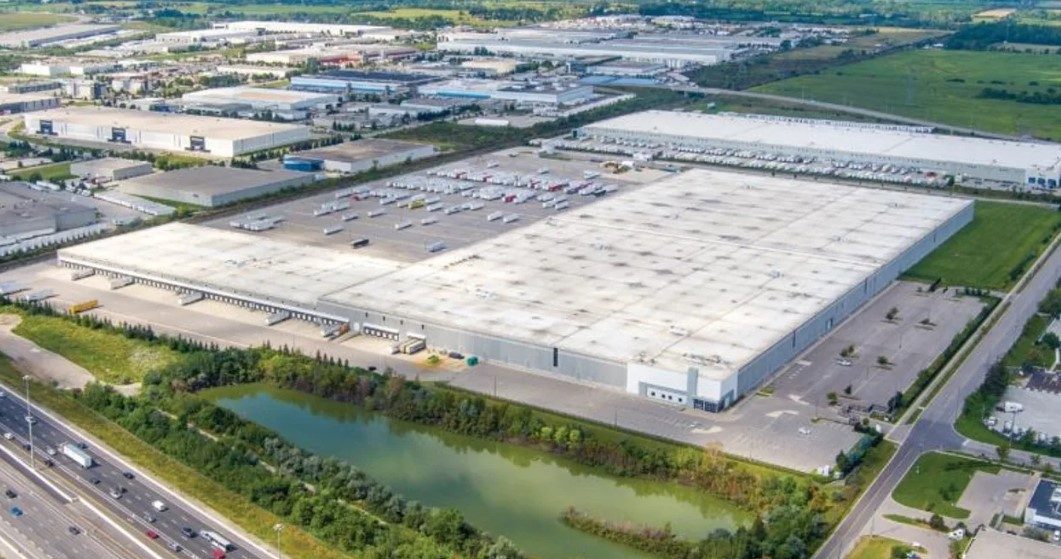- What Canadian industrial property transactions were down this year
- Why An uncertain economy and concerns over inflation convinced many investors to forgo deals
- What next Sales activity is expected to pick up in the latter half of 2025 as rate cuts take greater effect
Sales of industrial properties were down significantly year over year in 2024, but market pros are optimistic about the long-term health of the sector and expect transactions to pick up in 2025.
This year, many investors opted to stay on the sidelines and await a more preferable financial climate, even as lending rates continued to tumble. According to Green Street’s Sales Comps Database, volume through mid-December totaled $6.74bn, a huge slide from volume in the previous three years of $17.41bn, $12.73bn and $11.52bn.
The price/sq ft for industrial transactions has held relatively firm for the past seven quarters, following a spike in the first quarter of 2023.
Market slow despite rate cuts
Russell Wills, national industrial lead for Colliers, attributed the down year in part to hesitance from investors to deploy capital amid uncertainty surrounding inflation and Canada’s economic outlook.
While Wills is encouraged by the Bank of Canada’s recent aggressive cuts to interest rates to 5.45%, he said those moves likely won’t spur higher deal volumes in the short term as investors wait for a better financial climate.
JLL’s national research director, Scott Figler, estimated it will take six to nine months before the announced rate cuts have a meaningful impact on industrial valuations and transaction activity.
“It just takes time for market pricing to react to global news or interest rate [changes],” he told Green Street News.
“When interest rates went up in early 2022, we didn’t really see capitalization rates start to move meaningfully until almost 2023,” he explained. “It’s almost like people didn’t want to believe that cap rates were going up.”
Industrial users move in
Among those that opted to do deals, JLL found that users of industrial space comprised 16% of participants, representing $5.3bn of deals — the highest amount ever for the cohort on both bases, according to the brokerage.
The ramping up of acquisitions by users comes as industrial rents were nearing – and in the case of Vancouver exceeding – $20/sq ft. With many 10-year leases coming up for renewal in 2024, and interest rates starting to fall, it made sense for space users to take on the necessary debt to fund an acquisition.
“You can own a facility and bypass rent payments altogether, and that math is starting to make sense for a lot of industrial users,” Figler said.
Notable deals involving users in 2024 included Unilever triggering a clause in its lease with H&R REIT to take an ownership in its Brampton base of operations.
GTA remained central to industrial investment
Across markets, the GTA comprised nearly half of the total sales activity this year. Of the 1,853 industrial transactions counted by data provider Altus as of early December, 833 deals totalling $5bn were from the country’s largest property market.
Coming in second for the year’s industrial transaction activity was Vancouver and surrounding areas, which notched 360 deals in 2024, amounting for $1.6bn of sales. That included Bosa Properties acquiring a 315,000 sq ft industrial park in Surrey for $93m.
Montréal rounded out the top three, with 275 total transactions for $2.3bn of sales for 2024. That was the only market that saw transaction activity increase from 2023.
Foreign investment remained strong
Prologis in September notched the biggest industrial transaction of 2024, according to Green Street. The U.S.-based industrial giant acquired a 1.3m sq ft Milton warehouse at 8450 Boston Church Road for $361m, or $270/sq ft.
The industrial giant also bought a 1.6m sq ft Canadian Tire distribution centre in Brampton for $258m, or $161/sq ft.
In January, Spanish investment group Pontegadea closed the year’s second-largest deal, a $272m purchase of a 1m sq ft warehouse in Burnaby, B.C.
Canadian institutional investors – including domestic pension funds and insurance groups – continued to sit on the sidelines this year, making selective moves for portfolio management purposes. Alberta Investment Management Corp. sold a portfolio of GTA industrial properties for $149m in June.
“We saw institutional investors looking to optimize their portfolios amid a lot of uncertainty in the market,” Morguard’s senior director of research, Keith Reading, told Green Street News.
Data centre interest continues to grow
Across subsectors, data centres got a lot of media headlines in 2024, but that was more sizzle than steak, Altus vice president Ray Wong said.
The largest deal in the sector was Fengate Asset Management’s acquisition of 15 data centres from eStruxture for $1.8bn, and Amazon and Microsoft announced new facilities in Alberta and Québec, respectively.
With Altus tracking less than $10bn in total data centre transactions for Canada since 1995, the sector has room to grow. With the growth of AI and businesses and individuals seeking more capacity for local cloud computing storage, Wong says demand in the sector will only rise.
“The challenge with Canada is we don’t have the same supply as the U.S.,” Wong told Green Street News.
Trade tensions fueling concerns for 2025
While there’s a shared optimism that transaction activity will turn a corner in 2025, concerns that a pledge by incoming U.S. president Donald Trump to institute double-digit tariffs on Canadian exports could hamper a return to growth.
That said, it’s still too early to know what will happen, JLL’s Figler said, noting that similar demands made by Trump during his 2016 presidential campaign to revisit existing trade agreements ultimately ended up with Canadian exports to the U.S. shooting up in value.
“Those were boom years for Canada,” he said. “So I always remind people: Don’t believe the hype, don’t follow the noise. Wait to see what actually happens.”




